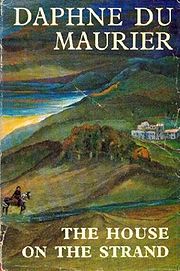
The House on the Strand
Encyclopedia

Daphne du Maurier
Dame Daphne du Maurier, Lady Browning DBE was a British author and playwright.Many of her works have been adapted into films, including the novels Rebecca and Jamaica Inn and the short stories "The Birds" and "Don't Look Now". The first three were directed by Alfred Hitchcock.Her elder sister was...
. First published in 1969 by Victor Gollancz
Victor Gollancz Ltd
Victor Gollancz Ltd was a major British book publishing house of the twentieth century. It was founded in 1927 by Victor Gollancz and specialised in the publication of high quality literature, nonfiction and popular fiction, including science fiction. Upon Gollancz's death in 1967, ownership...
, it is one of her later works. The US edition was published by Doubleday.
Like many of du Maurier's novels, The House on the Strand has a supernatural element (though in this case, it can also be accounted as science fiction
Science fiction
Science fiction is a genre of fiction dealing with imaginary but more or less plausible content such as future settings, futuristic science and technology, space travel, aliens, and paranormal abilities...
). It is concerned with the ability to mentally travel back in time
Time travel
Time travel is the concept of moving between different points in time in a manner analogous to moving between different points in space. Time travel could hypothetically involve moving backward in time to a moment earlier than the starting point, or forward to the future of that point without the...
and experience historical events at first hand - but not to influence them.
It is set in and around Kilmarth (where Daphne du Maurier lived from 1967) near the Cornish
Cornwall
Cornwall is a unitary authority and ceremonial county of England, within the United Kingdom. It is bordered to the north and west by the Celtic Sea, to the south by the English Channel, and to the east by the county of Devon, over the River Tamar. Cornwall has a population of , and covers an area of...
village of Tywardreath
Tywardreath
Tywardreath is a small hilltop village in southern Cornwall, United Kingdom. about north west of Fowey. It is located in a sheltered spot overlooking a silted up estuary opposite Par and near the beach of Par Sands...
, which in fact translates from the Cornish language
Cornish language
Cornish is a Brythonic Celtic language and a recognised minority language of the United Kingdom. Along with Welsh and Breton, it is directly descended from the ancient British language spoken throughout much of Britain before the English language came to dominate...
as "House on the Strand".
Plot summary
The narrator, Dick Young, has been offered the use of Kilmarth, the house of his biophysicist friend Magnus Lane, in Cornwall. He also agrees to act as a guinea-pig for a drug Magnus has developed.On taking it for the first time, he finds that it enables him to enter into the landscape around him as it was during the early 14th century. He becomes drawn into the lives of the people he sees there, particularly Lady Isolda Carminowe, and he is soon addicted to the experience.
Within the landscape Dick is compelled to follow Roger, steward to Sir Henry Champernoune, Lord of the Manor. Roger hides his enduring love for Isolda until the day he dies, and Dick comes to share this love.
Each visit corresponds to a key moment in the story of Isolda and Roger. Each time Dick returns to real time he is more confused; throughout the experience he is unable to interact with Roger or Isolda. Any attempt to do so brings Dick crashing back to the present in a state of nauseous exhaustion. (The drug has other dangers in that following Roger means that Dick walks unaware through the modern landscape with all the danger that entails.)
His wife, Vita, and stepsons join him in Cornwall and are worried by his bizarre behaviour. It is made clear that Dick does not truly love his wife, and certainly does not want to act as father to her sons—which makes plausible his increasing desire to escape into the past.
His friend Magnus intends to join Dick but before he does so is killed in what seems like a bizarre accident or suicide—struck by a train whilst straying onto the local railway track. Dick knows the truth, that Magnus was under the influence of the drug; this makes the inquest difficult.
Dick's second to last trip ends with him attempting to attack a woman named Lady Joanna in the 14th century, but in reality attacking Vita. She and her children hide from him and he contacts a doctor who helps to wean him from his addiction to the drug. Dick explains the power of the drug and the doctor has the drug analysed and reveals its extremely dangerous nature to Dick. However his addiction is such that he takes the last remaining dose soon after.
Dick's last visit to the 14th century culminates in Roger confessing his love and the fact that he ensured that Isolda died pleasantly rather than succumb to a worse fate. Roger dies and Dick wakes. Since both Roger (his doppelganger/receptor) and Isolda are dead, Dick has little incentive to return to the other world, but in any case there is no drug left to ease his passage there. As the book closes Dick attempts to pick up the phone but suddenly finds he is unable to grip it.
The ending is ambiguous: is Dick dead, paralysed or simply collapsing? Daphne du Maurier said of it:
"What about the hero of The House on the Strand? What did it mean when he dropped the telephone at the end of the book? I don’t really know, but I rather think he was going to be paralysed for life. Don’t you?"

